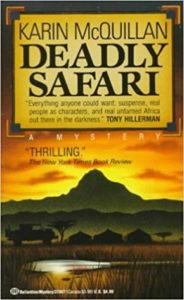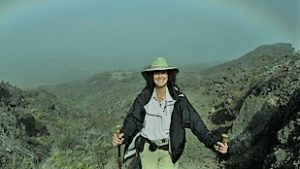The Last Word (on or about) RPCV Novelist Karin McQuillan (Senegal)
This is an email I received from novelist Richard Lipez (Ethiopia 1962-64) who writes mystery novels under the pseudonym Richard Stevenson. Note: JCoyne
“In 1997 I wrote the sub-Saharan Africa section of Crimes of the Scene: A Mystery Novel Guide for the International Traveler, edited by Nina King. Published by St. Martin’s, the book describes mysteries that travelers might like to read when visiting places where the novels are set. Here is my entry on Karin McQuillan’s Elephant’s Graveyard, published in 1993.
“For sophisticated understanding of present-day East Africa land-use and wildlife problems, no mystery writer is better than Karin McQuillan. A dedicated naturalist who appreciates the opposing viewpoints of conservationists, farmers, ranchers, and even poachers, McQuillan works these conflicts into the plots of murder mysteries featuring Jazz Jasper, a young American woman who’s fled a bad divorce back home and runs safari tours in Kenya.
“The second in the series, Elephant’s Graveyard, has a fine, creepy opening paragraph: ‘Dead bodies don’t last long out in the African bush. There’s nowhere to hide under that big clear sky.’ The man who’s been shot dead is Emmet Laird, the local head of Save the Elephants. His body has been heaped with brush to protect it against scavengers; elephants have covered him up, as they would one of their own. Jasper works in tandem with Police Inspector Ormandi to learn whether Laird’s murder was personal or the work of poachers.
“McQuillan is a remarkably revealing delineator of the African land and people, but be warned that Jasper’s personal life is often hard to fathom. She’s got a whiny American boyfriend, and she plays sexual games with Ormandi that are sometimes delightfully erotic and sometimes frightening. Take to her or not, among fictional sleuths in Africa, Jasper is an original.”
The following biography appeared on Amazon in connection with the publication of Karin’s first novel. It is an interview she did when her book came out on Kindle for Omnimystery News
I handed in a chapter each week as my writing assignment, and had a first draft by the end of the that year. The I rewrote Deadly Safari three more times, with the help of a terrific, very demanding writers group.
Omnimystery News: In what ways was your writers’ group helpful?
Karin McQuillan: I couldn’t have written any of the books without it. We were half a dozen women, and we stayed together for twenty years – the small size and the commitment to each other creates a lot of trust, so we could be very tough but supportive. Too many writers’ groups I’ve been in since are kind of babyish, just exchanging of compliments, as if writers are too fragile to take criticism. Or they don’t work hard enough on each other’s work – just listen to it read and on the spot, say the first thing that comes to your mind. In my beloved first group, we met once a month and each handed out a chapter to be discussed the following meeting. Each of would read and mark in detail everyone else’s chapter, and have time to think about it. So the feedback was very useful. Most of us ended up getting published, because we developed a professional attitude of demanding a lot of ourselves.
Omnimystery News: Was getting published hard?
Karin McQuillan: It took me one try to get an agent and six weeks to have St. Martin’s say yes to Deadly Safari. The main ingredient was luck. My timing was perfect. Sue Grafton had just led the way with her successful female P.I. and publishers were looking for women authors with strong women sleuths.
Omnimystery News: You got an extraordinary number of quotes and reviews for a first novel.
Of course, I was thrilled to get so many great reviews, from the Washington Post to Mystery News. Being nominated for an Edgar and talking at Bouchercon in London was a great honor and very thrilling. I was up against Patricia Cornwell, who had just written her first book and carried away the prize.
Omnimystery News: You created a detective duo, Inspector Omondi from the Nairobi homicide division and safari guide Jazz Jasper. Were they based on actual people you met in Kenya?
Karin McQuillan: I tried to create two main characters that I liked, faults and all, and that my readers would like. As a psychotherapist, I enjoyed giving Jazz some love problems she has to solve. She grows and evolves over the course of the four books.
The characters are composites of people I’ve met and imaginary personality traits and life history that I enjoyed putting together. I discovered that one of the great pleasures in fiction is the creative part of making up a character – giving them a history, a personality, dreams, drives, strengths and weaknesses, and trying to make them come alive on the page. Yes, of course you think of actual people, or more than one person, and you mine some of your own memories. Then you throw in traits you enjoy imagining that you aren’t blessed with – great courage, or a sense of humor.
Omnimystery News: Tell us how you came to set your mystery series in Kenya.
Karin McQuillan: Africa occupied a big part of my imagination from the time I was a toddler. My Dad was a combat photographer in WWII, where he was trained as a cinematographer. Back in the States, he couldn’t get into the union, and was struggling to make a living. Things were pretty desperate with two little girls at home, so when he got a job offer to spend 6 months in Kenya making a wildlife documentary, he jumped at it. I must have missed him terribly. It was all the more thrilling when he returned to us and entertained by sister and me for the rest of our childhood with his many stories of adventures among the animals in the wilds of Kenya.
Omnimystery News: How soon after the Peace Corps did you write Deadly Safari?

My hunch is that had Ms McQuillan been sent as a PCV to East Africa, instead of Senegal, it might have been a very different experience, and a book about being a volunteer. John Turnbull Ghana-3 Geology and Nyasaland/Malawi-2 geology assignment 1963, -64, -65,